Antifreeze Digital Refractometer PCE-DRA 1 Ethylene Glycol / Propylene Glycol
PCE-DRA 1
Availability : กรุณาติดต่อสอบถาม
PCE-DRA 1 Handheld Digital Refractometer
Waterproof IP65-rated antifreeze refractometer with easy-to-read LCD for use with propylene glycol- and ethylene glycol-based solutions
PCE-DRA 1 is a handheld digital antifreeze refractometer used to determine the percentage or content and freezing point of propylene glycol- and ethylene glycol-based solutions. This waterproof IP65-rated digital refractometer features automatic temperature compensation (ATC) from +10 … +40 °C / +50 … +104 °F, as well as a large, easy-to-read LCD that shows both the measured value and the temperature.
** Will not work with Organic Acid Technology (OAT) or Orange antifreeze **
**Close lid before measuring**
Fields of application
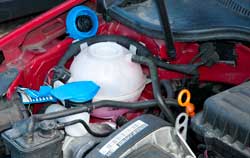 The variety of refractometers is overwhelming and the choice of the particular type of the device is determined by the life and production sphere. For example, a significant facilitation for the drivers and those who are involved into the automotive and transport industry and particularly maintenance of the vehicles is glycol refractometer. Handheld glycol refractometer may be applied by the common users, whenever the quality of the motor oils, anti-freeze, cleansing liquids should be tested. The correct and long-term flawless operation of the engines depends a lot on the agents used regularly. Glycol refractometer in no time allows making correct assessment of the solution and correspondingly, helps to prevent serious problems which arise when, for example, coolants and anti-freezing solutions applied do not meet the requirements.
The variety of refractometers is overwhelming and the choice of the particular type of the device is determined by the life and production sphere. For example, a significant facilitation for the drivers and those who are involved into the automotive and transport industry and particularly maintenance of the vehicles is glycol refractometer. Handheld glycol refractometer may be applied by the common users, whenever the quality of the motor oils, anti-freeze, cleansing liquids should be tested. The correct and long-term flawless operation of the engines depends a lot on the agents used regularly. Glycol refractometer in no time allows making correct assessment of the solution and correspondingly, helps to prevent serious problems which arise when, for example, coolants and anti-freezing solutions applied do not meet the requirements.
This antifreeze refractometer PCE-DRA 1 is used for the rapid determination of the antifreeze content in aqueous solutions. With this digital coolant refractometer PCE-DRA 1 you can quickly and accurately determine the content of the antifreeze in your equipment and machines. This handy refractometer PCE-DRA 1 is used in industry as well as in the automotive sector.
Simply put a few drops of the liquid into the stainless steel sample tray with the glass prism, close the lid, start the measurement and read the result on the display. In the operating instructions for the vehicle or the system you will find information on the mixing ratio of the antifreeze. This should be observed not only in winter, but all the year round, as additives for corrosion protection and for maintaining the coolant circulation are also added to the antifreeze. Workshops for motor vehicles often check the mixture ratio above the freezing point of the cooling water. For many areas, a freezing temperature of the coolant of – 27°C is recommended. The addition of “antifreeze” is also necessary in the frost-free areas, as this not only lowers the freezing point of the coolant, but also increases its boiling point. If you have measured the values that are beyond the recommended range, you can remove some cooling water and add either antifreeze or water as required. Then carry out a new measurement with the antifreeze refractometer.
Per measurement, the digital refractometer PCE-DRA 1 can determine either the concentration or the freezing point of the mixture. If you want to check both, carry out two measurements. Before starting the measurement, select the desired characteristic curve in the menu of the device:
> S01 – Concentration of ethylene glycol in the coolant in percent by volume,
> S02 – Freezing point of coolant with ethylene glycol,
>S03 – Concentration of propylene glycol in the coolant in percent by volume,
> S04 – Freezing point of coolant with propylene glycol.
When measuring, a distinction must be made between the antifreeze agents based on ethylene glycol and those based on propylene glycol.
Ethylene glycol (also monoethylene glycol, ethylene glycol, ethanediol) is mainly used in the motor vehicles. With this glycol, the freezing point of the cooling water drops to around -10 °C to -40 °C at a proportion of 20 to 50 percent, depending on the manufacturer. With a higher proportion of ethylene glycol, the freezing point rises again and is around -13 °Celsius when used undiluted. Propylene glycol (also monopropylene glycol, propanediol) is less toxic and is decays more quickly. It is therefore used for cooling and heating systems in the food and pharmaceutical industries, as well as for solar systems and heat pumps. The freezing point of propylene glycol drops down with increasing concentration to approx. -59 °C in undiluted application.
The manufacturer has designed the antifreeze refractometer to protect the glass prism from damage. The simple operation guarantees a user-friendly handling and almost excludes the wrong operation of the car refractometer. In order to save the battery of the instrument, the manufacturer has equipped the antifreeze refractometer with an automatic switch-off function. When not in use, the refractometer switches off automatically after one minute. If necessary, the user can calibrate the automotive refractometer himself at any time by placing a few drops of distilled water in the measuring tray and pressing a button to start the calibration.
The task for a reputable manufacturer is to offer good quality and safety. The user wants a reliable product with a long service life. What both want is to avoid mistakes and failures. The use of auxiliary equipment – such as a coolant refractometer in this case – reduces the risk of equipment failure and that quality deteriorates significantly during the manufacturing process. Modern high performance equipment often causes the substances and liquids to heat up, and the use of the coolants and antifreeze of a poor quality will guaranteed cause breakdowns and rapid wear. A portable coolant refractometer is an instrument that allows the driver and operator to strictly control the condition of the liquids used to support the engine operation. Both too low and too high concentrations can mean for the engine and other parts of the vehicle the end of the service life. The system can become clogged with dirt, surfaces can overheat, various types of corrosion, leaks and many other problems can occur – this is the result of using the antifreeze or coolant with unnecessary additives and bubbles. In everyday life, the coolant refractometer is a reliable guardian that contributes to a long life of the vehicle with very few problems.
– Measurement parameters: Ethylene glycol, propylene glycol, temperature
– Automatic temperature compensation (ATC) from +10 … +40 °C / +50 … +104 °F
– Handheld and portable
– User-friendly 3-button operation
– Fast and precise measuring results in approx. 1 sec.
– ABS plastic housing with IP65 ingress protection rating against water and dust
– Large, easy-to-read digital LCD shows both the measured value and the temperature
– Average function measures same sample 15 times and displays the mean value
– Stainless-steel ring on sample well protects glass prism from damage
– Internal light source for improved accuracy
– Small liquid sample size of just 4 to 5 drops
– Easy calibration with distilled water
– Battery-saving automatic power off after 1 min. of inactivity
0 … 60 % ethylene glycol or propylene glycol content (v / v)
-50 … 0 °C ethylene glycol
-60 … 0 °C propylene glycol
0 … +40 °C / +32 … +104 °F temperature
Resolution
0.1 % / 0.1 °
Accuracy
±0.5 % / ±0.5 °C
General specifications
Automatic temperature compensation (ATC) range: +10 … +40 °C / +50 … +104 °F
Measurement speed: Approx. 1 sec.
Sample size: 4 to 5 drops of liquid
Sample well: Stainless steel ring over glass prism
Housing: ABS plastic, IP65 ingress protection rating against water and dust
Power supply: 1 x 1.5V AAA battery
Dimensions: Approx. 121 x 58 x 25 mm / 4.76 x 2.28 x 0.98″
Weight: Approx. 90 g / 0.2 lb (without battery)
เฉพาะลูกค้าที่เข้าสู่ระบบ และเคยซื้อสินค้าชิ้นนี้แล้วเท่านั้น ที่เขียนบทวิจารณ์ได้
สินค้าที่เกี่ยวข้อง
Refractometers
PCE-DRU 1
Refractometers
PCE-010
Refractometers
PCE-4582
Refractometers
PCE-DRH 1
Refractometers
PCE-018
Refractometers
PCE-032
Refractometers
PCE-DRB 2
PCE-DRC 1

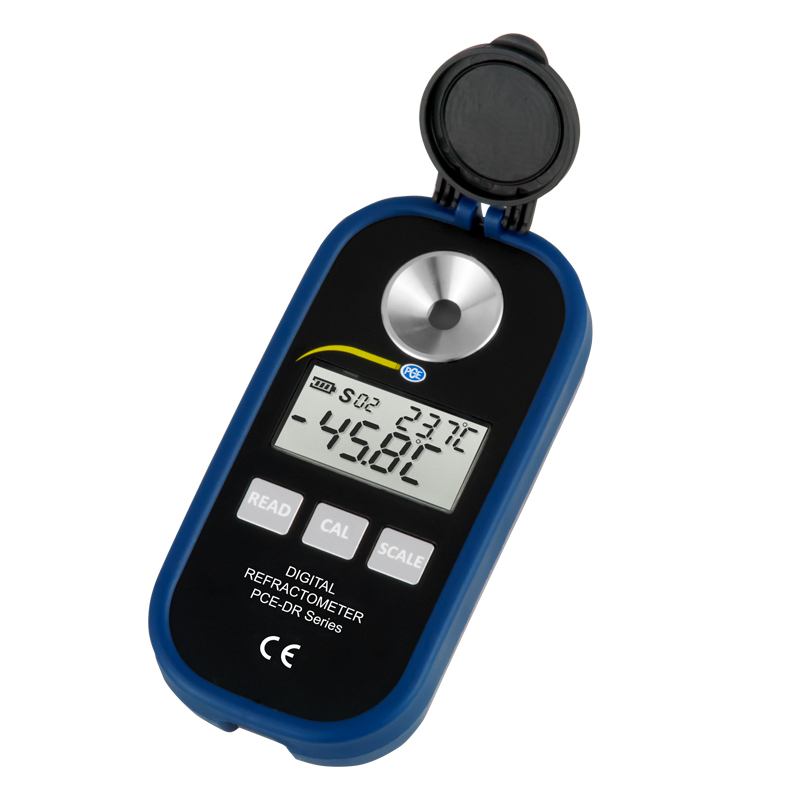

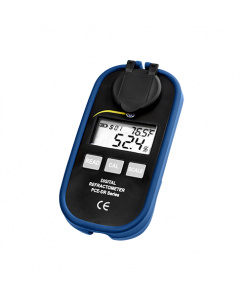
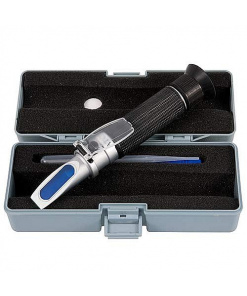

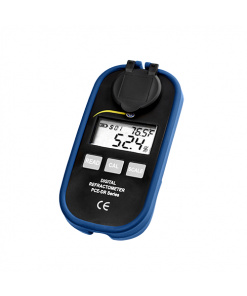
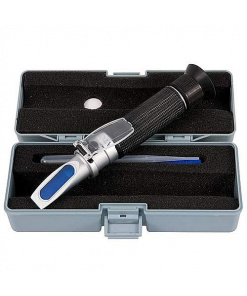
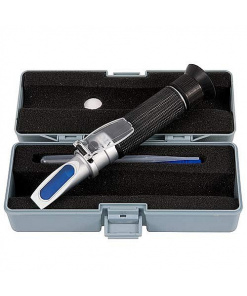
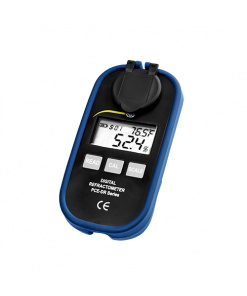
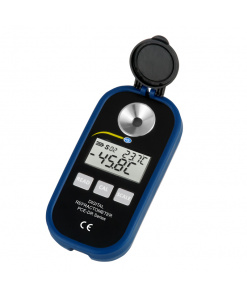
รีวิว
ยังไม่มีบทวิจารณ์